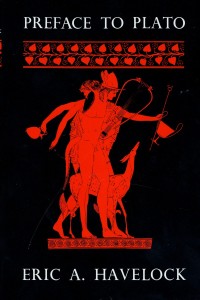Preface to Plato by Eric Havelock
My summer project of reading Ancient Greek Philosophy got off to a rough start when I stumbled through Plato’s Republic. Expecting an insightful, albeit idealistic political solution, I was sorely confused. Interspersed between polemics against Poetry and Homer, I found traces of a simplistic, totalitarian regime. Even the running of this regime was not elaborated upon, except in the branch of education.
After scouring the internet wildly for answers, I found two likely solutions to my quandary. The first, was the following review:https://www.goodreads.com/review/show…
The second was this book.
From what I understand, Havelock’s fundamental aim is to trace the transformation in the Greek Mind through Plato’s writing. The main premise is that Plato’s society was still largely illiterate, and thus Plato’s attack against Poetry is in fact an attack on a ‘pre-literate’ source of knowledge that is lacking in logical consistency and factual correctness, that we take for granted in our own encyclopaedias. Havelock is arguing that Ancient Greeks literally ‘believed’ in Poetry, and this is the rational for Plato’s attack. From this perspective, the state that is constructed in Plato’s Republic is simplistic because it is brought in only for the sake of the argument on Poetry. The details in education are given because of the role Poetry played in Ancient Greek education, and this is the aspect of Poetry that Plato is attacking.
Havelock makes a lot of other insightful points about vocabularly etc, half of which went over my head. Aside from the the Republic and Homer’s Odyssey, I haven’t read any of the other sources he quotes. Further I do not understand Greek. For these reasons, it’s possible that the evidence Havelock brings to support his claim is faulty. However, the construction of his hypotheses, whether they are validated by fact or not, is intriguing in itself. He really made me think, and question in a way I was not used to. For example this is how it starts:
“It sometimes happens in the history of the written word that an important work of literature carries a title which does not accurately reflect the contents. A part of the work has become identified with the whole, or the meaning of a label has shifted in translation. But if the label has a popular and recognisable ring, it can come to exercise a kind of thought control over those who take the book in their hands. They form an expectation which accords with the title but is belied by much of the substance of what the author has to say. They cling to a preconception of his intentions, insensibly allowing their minds to mould the content of what they read into the required shape.
These remarks apply with full force to that treatise of Plato’s styled the Republic. Were it not for the title, it might be read for what it is, rather than as an essay in utopian political theory. It is a fact that only about a third of the work concerns itself with statecraft as such. The text deals at length and often with a great variety of matters which bear on the human condition, but these are matters which would certainly have no place in a modem treatise on politics.”
Where have you been all my life? Not only is he answering my concern about the lack of political theory, he is making the seemingly obvious hypothesis that maybe it is not about political theory at all. The presentation of this hypothesis, however, disguises its sheer brilliance. Through all my confusion, I not once doubted that Plato aimed to write on political theory.
“So it is that the long sleep of man is interrupted and his self-consciousness, separating itself from the lazy play of the endless saga-series of events, begins to think and to be thought of, ‘itself of itself’, and as it thinks and is thought, man in his new inner isolation confronts the phenomenon of his own autonomous personality and accepts it.”
This comes at the end of the chapter in which he draws a link between the transformation from an oral to written culture, and how it results in a realization of self. Not sure if I buy it completely, however, it asks really interesting questions about the impact of our means of communication on our fundamental thinking. The way he describes the process of self-realization is equally fascinating.
“Yet the day would come when the original drive of the Platonic method would revive, and the phenomenal flux would once more be examined and penetrated and subordinated to categories of explanation which possess a wholly abstract integrity. And when this day came, science would awaken again.”
While this is slight less original, in that he seems to be merely documenting the return of ‘rationalism’. However, while few people claim to be Platonic idealists, the way we continue to describe our world in abstractions definitely has deeper parallels to Plato then I initially thought. Once again, his description of this historical process is in itself, thought-provoking.
Ultimately, Preface to Plato not only helped me understand Plato’s Republic better, as an exposition of hypotheses, it is commendable.


 Follow
Follow